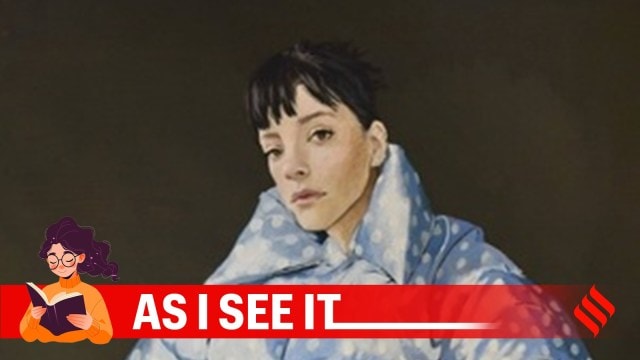Critics are calling it her most fearless work yet, while fans obsessively pick apart its verses on Reddit, TikTok, and Instagram, trying to untangle art from autobiography. The tabloids, predictably, smell blood.

West End Girl is a chronicle of betrayal and bewilderment, its lyrics raw, often shocking in their intimacy. “I can’t shake the image of her naked / On top of you and I’m dissociated,” Allen confesses in “Ruminating.”
Story continues below this ad
It is similar to Slyvia Plath’s “Poppies in July” rewritten for the age of insomnia and smartphones — “Little poppies, little hell flames, / Do you do no harm?” becomes “Ruminating, ruminating, I’ve been up all night.” Both women stare into the burning field of infidelity and ask what kind of light pain gives off.
The domestic trap
In “Tennis,” Allen describes the moment her life unravels with surgical precision: “Daddy’s home for the first time in weeks / Got the dinner on the table, tell the kids it’s time to eat… / So I read your text, and now I regret it / I can’t get my head ’round how you’ve been playing tennis.”
It’s domestic realism worthy of Plath’s “The Applicant,” where the poet skewers the institution of marriage — “Will you marry it, marry it, marry it?” — reducing love to transaction. Both women reveal how the marital home becomes a stage set with the food still warm, the children still innocent, while the air between husband and wife curdles.
Plath’s house was a site of psychic suffocation. Allen’s brownstone is haunted by Wi-Fi signals and deceit. In the album’s opening track, “West End Girl,” Allen recalls: “We found a nice little rental near a sweet little school… / You found us a brownstone, said ‘You want it? It’s yours.’”
Story continues below this ad
 After a seven-year hiatus, Allen’s new album deals with the fallout of an open relationship. (Source: YouTube)
After a seven-year hiatus, Allen’s new album deals with the fallout of an open relationship. (Source: YouTube)
The scene reads like the first chapter of a domestic novel before it splinters into horror. What Plath once called “the prison of my own body” becomes, for Allen, the prison of a perfect life curated for Instagram.
Digital Intimacy
Allen’s heartbreak is modern in its architecture. In “Just Enough,” she sings: “You give me just enough / Hope to hold on to nothing.”
Plath’s despair was solitary, Allen’s is searchable. The British pop star turns emotional labor into metadata. “My heartbreak,” she seems to say, “has a digital footprint.”
In “Sleepwalking,” Allen sounds eerily like Plath’s speaker in “Tulips”: “You won’t love me, you won’t leave me / You don’t touch me but still so needy.” Plath wrote, “The tulips should be behind bars like dangerous animals; / They are opening like the mouth of some great African cat.” Both women conjure the claustrophobia of being desired but unseen, present but unheld.
Story continues below this ad
The woman named Madeline
The album’s emotional core lies in “Madeline,” where Allen turns the other woman into a mirror: “I know none of this is your fault… / He told me it would stay in hotel rooms, never be out in the open.”
The song unfolds as a dialogue that mirrors Plath’s “Words heard, by accident, over the phone,” where she listens to her husband’s betrayal and writes, “I heard the voices of lovers, / None of them mine.”
In Allen’s 21st-century version, the communication is no longer accidental but incessant, including texts, voice notes, the eternal “ping” of evidence. Both women share the same ache that modern intimacy is also surveillance.
The grotesque and the resurrection
 A famous verse from Sylvia Plath’s ‘Lady Lazarus.’
A famous verse from Sylvia Plath’s ‘Lady Lazarus.’
By the time Allen reaches “Nonmonogamummy,” she’s turned her tragedy into dark comedy: “I’ll be your nonmonogamummy / I’m just trying to be open.”
Story continues below this ad
It’s the absurd climax of a woman negotiating her own erasure, what Plath once called “the theatrical comeback in broad daylight.” In “Lady Lazarus,” Plath performs her rebirth: “Out of the ash / I rise with my red hair / And I eat men like air.”
Allen’s resurrection happens not in a poem, but on a dance floor. “Now I’m a West End Girl,” she repeats, a middle finger of sorts.
Beyond confession
If Plath wrote to exorcise the ghost of a husband’s influence, Allen writes to reclaim her reflection from the algorithm. She told British Vogue, “I made this record in December 2024 and it was a way for me to process what was happening in my life.” What she has made, in truth, is a pop requiem for marriage and for the self.
If Plath gave us the language of the wound, Allen gave us the soundtrack. Both women understand that to confess is not to collapse. To say, “This is what you did to me,” and also, “This is who I became because of it.”
Story continues below this ad
“Wish I could fix all your s**, but all your s***’s yours to fix,” Allen spits. Plath, decades earlier, wrote in “The Jailer”: “I have been drugged and raped. / Seven hours knocked out of my right mind. / The worst has happened.” Both are unsparing in their detail and unashamed of their fury.
If Plath rose from the ash, Allen dances through it. Where the poet wrote against silence, the singer writes over the beat. Their tools differ, but their project is the same: reclaiming authorship from the men who made them muse.



 After a seven-year hiatus, Allen’s new album deals with the fallout of an open relationship. (Source: YouTube)
After a seven-year hiatus, Allen’s new album deals with the fallout of an open relationship. (Source: YouTube) A famous verse from Sylvia Plath’s ‘Lady Lazarus.’
A famous verse from Sylvia Plath’s ‘Lady Lazarus.’





























